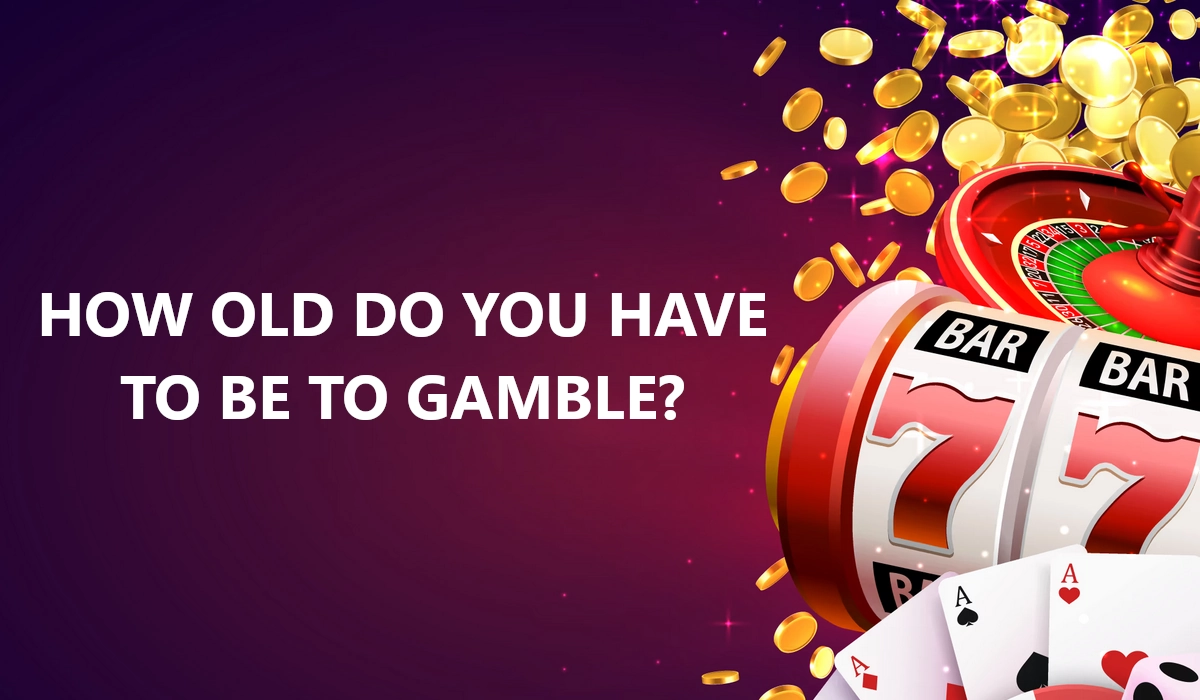
How Old Do You Have To Be To Gamble?
🗝️ Key Takeaways
- The Individual states determine the United States' gambling age laws. Age restrictions can differ significantly depending on where you live.
- In the U.S., the age to gamble varies state by state, but the most common legal ages are 18 and 21. The minimum age depends on the type of gambling and the individual state’s regulations.
- Arbitrary age limits do nothing to prevent gambling-related harm among youth. They encourage positive and responsible gambling behaviors and help protect the integrity of legal gambling operations.
- Penalties for underage gambling can include significant legal penalties, denial of winnings, and damage to future financial history.
- Before engaging in any gambling activities, it's essential to confirm your state’s current legal age requirements and follow all local laws.
- By playing responsibly and only on sites with strong age verification, players can enjoy a safe, secure, and age-appropriate gambling experience.
How Old Do You Have To Be To Gamble? In the United States, the answer isn't so simple—it varies by state and by the type of gambling. Most states require you to be 21 years old to enter and play at a casino. However, there are a few where the legal gambling age is just 18.
For instance, California and New York mandate a minimum age of 21 for all casino gambling. Meanwhile, states like Oklahoma and Montana allow some forms of casino gambling starting at 18. The age requirement is often lower when it comes to lotteries, bingo, or betting. Online gambling typically follows the same legal age as land-based betting in each state.
Because laws differ so widely, it's important to ask: How old do you have to be to gamble in your state? Knowing your local laws not only keeps you informed—it keeps you out of legal trouble. In the next section, we explore how gambling age laws differ across states and by gambling activity.
🛡️ Why Gambling Age Limits Matter
Fixing a legal age for gambling is not merely a bureaucratic formality—it is a protective line against the forces that prey on our communities. Age limits are critical to maintaining the integrity of gambling, protecting young people, and defending the interests of states. These legal age requirements are part of broader specific regulations that promote responsible gambling and community welfare.
These regulations represent the intersection of public health, social equity, and economic considerations, tempered by state statute and community standards.
✨ Protecting Young People
Young people and adolescents are especially at risk of experiencing the negative effects of gambling. Their brains are still developing, sometimes until their mid-20s. This change in brain structure makes them more susceptible to engaging in risky behavior and making impulsive decisions they will regret in the future.
Without stable income or financial literacy, youth may overspend and immediately find themselves in debt. The earlier someone starts gambling, the higher the chances that they’ll become addicted. It is associated with several harmful outcomes, including the onset of stress and family/academic issues.
This is why educational programs like Stop Predatory Gambling’s National Education Campaign are vital. These programs demonstrate to kids what these risks are, educate them about making smart choices, and help families identify warning signs early on.
⚖️ Ensuring Fair Play Integrity
Age restrictions protect the fairness of the game for all players. Whether in-person or online, every gambling operator must implement rigorous age verification to ensure players meet the minimum age threshold. This fosters people’s trust that they will be treated fairly and safely.
Allowing underage gambling to run rampant creates a higher risk of fraud, eroded consumer trust, and, ultimately, greater legal liability for operators. Age restrictions not only preserve the integrity of fair play, but shield young adults from being scammed or making reckless decisions in casino-like environments.
🏛️ State Revenue and Control
Legal age requirements allow states to monitor who plays, tax their play, and maintain the integrity of this booming industry. When underage gambling slips through the cracks, states lose out on important revenue that can support public services.
This further opens the door to unregulated activity. Establishing specific regulations and clear age requirements sets the stage for a regulated, predictable, and transparent gambling industry that serves the best interests of all states.
🎰 US Gambling Age Explained
American gambling age laws are incredibly inconsistent. Every state has a unique history, a set of priorities, and a regulatory mindset that crafts every state’s rules and regulations. However, there is no one universal federal age standard for gambling. Instead, individual states are left to regulate, forcing would-be gamblers to deal with a patchwork of competing and often confounding state-specific regulations.
Understanding these laws is important, whether you want to visit a land-based casino, play the lottery, bet on sports, or try your luck online. The gap in age limits is not just a legal technicality. It impacts access, shapes opportunities, and governs the kinds of games folks can play in various parts of the country.

1. No Nationwide Gambling Age
No Federal Gambling Age. What this entails is that there is not one federal rule that applies uniformly across the United States. Instead, it’s up to each individual state to determine what age a person can place a wager. Other states set one minimum age for all gambling activities.
On the other hand, states like Virginia set different age requirements for different activities. This decentralized approach provides greater flexibility to states but inadvertently poses greater risks to individuals who travel or relocate across state lines. In one state, an individual may be old enough to purchase a lottery ticket.
Yet in another state, that same individual may be prohibited from entering a casino at all. This inconsistency can lead to significant confusion, most importantly for those young adults who are on the cusp of the legal cutoff. It’s no longer acceptable for individuals to be turned away or refused service just because the regulations differ from state to state.
2. The Common 18 vs 21 Divide
For one thing, many states already allow gambling at age 18 for the lottery, bingo, and sweepstakes casinos. For casinos, poker rooms, and sports betting, the age is typically 21. This divide represents not only historical precedent, but a belief that younger individuals should not be exposed to gambling in more risky settings.
The likelihood of gambling harm is clearly higher with casino games and sports betting. By implementing stricter age restrictions, younger individuals who are more vulnerable to addiction and impulse control issues are better protected. Of these states, Montana, Oklahoma, Rhode Island, and Wyoming establish the minimum age for casinos at 18.
They’re going against the grain of the national trend! In other states, the age varies based on whether alcohol is allowed on the casino floor. This divide shows that minimum age requirements are based on the type of game being played. They’re a function of the environment and the risks seen to be involved.
3. Casino Floor Age Requirements
The minimum age to enter a casino floor differs from state to state. In places like Nevada and New Jersey, which are home to famous gaming destinations, the rule is clear: you must be at least 21 to enter the casino and play slots, table games, or poker.
Some states permit entry at 18, particularly in venues that do not serve alcohol. This extends to establishments where certain games are provided. Requirements differ even within one state. These differences can also be affected by local ordinances and the casino, commercial, or tribal.
For example, in Oklahoma, there are some casinos where 18-year-olds can play bingo games. Players need to be 21 to use a slot casino floor or table game. Due to these nuanced differences, it is always best to verify local laws before planning a visit to a casino.
4. Online Casino and Poker Ages
The great majority of states that have authorized online casinos or poker make the minimum age 21. This is in large part thanks to federal pressure and the need to maintain online gambling uniformity with land-based age restrictions. There are caveats, too.
A handful of states allow 18 year olds to gamble online, provided the state’s corresponding land-based age is 18 as well. Age verification is particularly stringent in the online realm. Operators use tools such as ID checks, database lookups, and in some cases, video calls to confirm a player’s age.
This serves to protect against underage gambling and is in compliance with state law. The difference in online vs land-based requirements are stark and surprising to many. This is particularly problematic for players who travel across state lines or play on websites governed by laws in other jurisdictions.
5. State Lottery Age Rules
State Lottery Age Rules Only 4 states allow those under 18 to purchase state lottery tickets. This applies to both scratch-off and draw lottery games. Very few states like Nebraska only allow players starting from 19.
Some states even go as high as 21 for specific games or lottery-related promotions. The implications of underage play are clear: tickets bought by someone underage are void and any winnings are forfeited. Retailers may be subject to penalties and/or revocation of their license for selling to minors.
Similar to other lotteries, this rigorous enforcement aims to deter underage gambling and maintain the integrity of the lottery system.
6. Sports Betting Minimum Age
Legal sports betting, being a relatively new introduction in many states, have – for the most part – set the minimum age to 21. This is in line with the age for casino gambling in those states. There are exceptions: states like Montana, New Hampshire, and Rhode Island allow 18-year-olds to place sports bets.
The recent surge in legal sports wagering hasonly increased this demand for age verification. Online apps and websites are required to verify the age of users before allowing them to make a bet. Understanding gambling age laws in your state is crucial, as the consequences for underage gambling can be severe.
7. Bingo Participation Age Limits
Bingo remains a core part of both dedicated commercial halls and charity fundraisers. Usually, the minimum age to play bingo is 18 years old. The minimum age may be less for charitable games of chance, particularly if they’re suitable for family consumption or not dependent on monetary awards.
Minors are permitted to engage in bingo only where a parent or guardian is playing with them in some states. The game’s widespread appeal means that more cavalier age restrictions are sometimes possible. Once cash prizes enter the equation, it’s obvious that there are strict boundaries in effect.
Commercial bingo halls are particularly strict about age limits, usually reflecting similar rules for the lottery.
8. Horse Racing Betting Age Guide
Betting on horse races typically has players set at 18, at the track and online. Horse racing is unique in that it often predates modern casino gambling laws, so the age requirements tend to be lower and more consistent nationwide.
A few other states connect the age of horse racing betting to the age of 21 and up at the casino. As always, knowing the lay of the land is key. This is particularly the case now, as almost every track has added slots and other gaming options to horse betting.
9. Tribal Casino Age Variations
That’s because tribal casinos are regulated differently from their state-regulated counterparts. Because tribal governments are sovereign entities, they can establish their minimum gambling ages, which may be different from the standard set by the state.
Some of these tribal casinos allow players as young as 18 on the floor, despite state law stating they must be 21. Such exceptions can be found at many casinos in California and Washington state. These nuances underscore the special status of tribal gaming and introduce another layer for gamblers to navigate.
🎲 Can You Gamble Legally at 18?
The legal gambling age is different in every state in the U.S. The answer depends on where you are, a
s each state has its own rules. They vary based on the type of gambling at issue.
It’s not unusual for states to place the gambling minimum age at 18. This is true for the state lottery, most forms of sports betting, and most tribal casinos. The regulations are not so cut and dry. Both the kind of gambling you wish to do and the state you reside in are important.
Before participating in any gambling, make sure you are aware of your state’s laws to avoid a possible fine or suspended driver's license.
📍 Where 18+ Gambling is Allowed
Here are the places where you can legally gamble at 18+. In states like Kentucky, New Hampshire, and Wyoming, you are allowed to place sports bets as soon as you’re 18 years old. Tribal casinos in states such as California and Oklahoma usually do as well.
State lotteries are usually available to anyone aged 18 and older. Not all forms of gambling are available at this young age. Being aware of your local laws is extremely important.
If you are discovered participating in unlawful gambling you may face a penalty of up to $1,000. You may have your driver’s license suspended for up to six months.
💳 Activities Typically Requiring 21+
Other common casino games, such as slots and table games, typically require you to be 21 or older. That’s the case in states like Nevada and New Jersey. Lawmakers will try to increase the minimum age for each of these pastimes.
They are trying to protect younger adults from possible hazards, since casinos can be very financially destructive. In addition, some states, like Pennsylvania and Michigan, make you wait until 21 to play at their internet casinos.
📜 Understanding Local State Laws
Always consult your state’s gambling laws before you gamble. Every state is different, and they’re changing quickly. The best way to find out the gambling age in your state is by going directly to state government websites or sites that provide legal assistance.
By knowing what you can and can’t do, you can prevent making errors and facing potential punishments.
⚖️ Online Versus Land-Based Rules
Rules regarding the minimum gambling age can vary widely between online and in-person environments. Most US land-based casinos already have a minimum age of 21. This is consistent with drinking laws, as casinos are typically licensed to serve alcohol.
Some tribal casinos and state-run venues are able to permit gambling at 18 or 19, and these venues may not serve alcohol. In others, the minimum age is 18 to purchase lottery tickets or bet on horses. Yet, the rules are fraught with pitfalls.
In most cases, the minimum gambling age online is 21. Only a few states in the US – like New Jersey, Pennsylvania, and Michigan – permit their residents to gamble on casino games online.
🌍 Geolocation and Age Verification Tech
For example, online gambling sites employ geolocation technology to ensure players are located in states where online gambling is legal. They require highly sensitive personal information such as ID scans or Social Security numbers.
This geolocation and age verification tech is powerful, but not infallible. Kids often slip through these checks, particularly if they’re using a parent’s information. Robust anti-circumvention systems leave no room for underage play.
This is only because sites have to constantly be one step ahead of new tricks and techniques that are developed. In the UK and Canada, online gambling sites use comparable verification technologies. The minimum age to access these sites differs by province or country, beginning at either 18 or 19.
🚨 Differences in Enforcement Challenges
Perhaps the most significant difference lies in the regulators themselves. Moreover, while land-based casinos can verify IDs in person, this makes it significantly more difficult for minors to gain access.
Online, verification is performed via data and digital documentation, which can be easily falsified or obtained from a different source. Offshore locations further compound the problem. They mostly flout local regulations, leaving openings for underage players to gain access.
This creates untenable conditions for regulators to enforce and monitor the game.
💣 Offshore Sites: A Risky Bet
Playing on offshore sites is a riskier bet. These sites either do not verify ages or they do so poorly, and players lose any legal recourse when something goes awry.
Local laws are clear: Only play on licensed sites. This protects consumers and protects everyone's integrity in gambling.
🚫 Consequences of Gambling Underage
In the U.S., the dangers of underage gambling can extend much deeper than you realize. In New Jersey, to take one example, it’s 21. Those who are found gambling underage are subject to more than just a slap on the wrist. What’s often lost in the shuffle is just how bad the consequences can be, both immediately and long-term.
💥 Legal Penalties You Could Face
Law enforcement considers gambling underage a high-priority crime. Fines vary from $500 to $1,000. Penalties may involve up to six months imprisonment, probation, and community service. For example, a first offense may result in a six-month driver’s license suspension.
If you’re under 17, it might even postpone when you can get one. Parents or legal guardians may be charged with a disorderly person offense if their minor child is apprehended for gambling. These charges result in a criminal record, which can trail an individual for years, affecting their ability to secure future employment or loans.
💸 Forfeiting Winnings and Accounts
What’s more, casinos and online sites prohibit keeping winnings for players underage. If you are caught, all winnings up to three years are forfeited. No notice, no explanation. Accounts are regularly suspended or closed without warning.
Even legitimately deposited money can be forfeited. This policy protects state casinos and police gaming regulations efficiently. It does have the effect of making underage gamblers lose money and get barred from playing again.
📝 Long-Term Financial Record Impacts
Criminal consequences associated with underage gambling can negatively impact a minor’s credit and overall financial history. Banks and other lenders can use these convictions as red flags. Consequently, it may be harder for you to obtain credit cards, personal loans, auto loans, or even housing.
These risks extend beyond the match itself and can determine one’s long-term fiscal health for decades.
🎲 VistaGamble's Take: It's Never Worth Risking
The negative consequences of gambling underage far exceed any temporary excitement. Responsible decisions protect futures.
🗺️ Navigating State Gambling Laws
Navigating state gambling laws in the United States is often like assembling a jigsaw puzzle. As each state's gambling law is its own animal, what gains acceptance in one jurisdiction may not be in the cards for another.
Everyone assumes 21 is the baseline age for casinos and sports betting. That’s not the case in states like Nevada and New Jersey. In other places, 18-year-olds are allowed to play bingo or purchase lottery tickets.
Tribal casinos often have their own age requirements as well, particularly if they’re non-gaming casinos, meaning they don’t serve alcohol.
🔍 Why Rules Vary So Much
State laws regarding gambling ages are not arbitrary. Politics, culture, and impact on local economies dictate the regulations.
Other states have the goal of preventing younger adults from gambling. On the opposite end, proponents say it’s an opportunity to increase tourism and help pay for state programs.
You may be surprised to learn that some states raise the casino gambling age to 21, but allow 18 year olds to purchase lottery tickets. It’s especially important for travelers or people relocating for work to understand these distinctions.
Getting it wrong can result in costly fines or criminal prosecution.
📜 Checking Your Specific State Rules
Before placing a bet wherever you go, visit your state’s official gambling website or gaming commission to see the latest regulations. Laws change quickly and frequently, and online resources sometimes fail to reflect those changes.
Don’t rely on a friend’s insider advice. If you make the wrong bet, you may be subject to fines or even be removed from the establishment.
By using the official resources, you’ll be able to avoid making those missteps.
✈️ How Laws Impact Travel Plans
Before you travel to a new state or tribal casino, do your research on local gambling laws. Age limits can change from border to border, and online gambling prohibition that exists at home may not apply elsewhere.
Some states prohibit online games entirely, while others permit them under heavy regulations. So, always carry your ID, and plan to stay only in approved zones — more important than ever if you’re under 21.
🆔 Importance of Knowing Legal Ages
Understanding the legal gambling age is important for anyone looking to gamble. This information is important to know whether you’re in-person at a casino, betting online, or at a racetrack. In the United States, the legal gambling age can vary by state.
For casinos, the minimum age is 21 in most states. Others let people as young as 18 engage in state-funded lottery games or wager on horse races.
These rules are more than suggestions—they’re laws designed to safeguard underage individuals from the dangers associated with gambling. When a minor attempts to gamble, both the individual and the establishment can be charged with fines or other legal issues.
Being aware of the right age stops players from losing money or access to winnings if they get caught. Most land based casinos and online wagering platforms will require some form of identification to ensure that players comply with the legal age requirement.
This procedure protects both the gambler and the gaming industry by ensuring that both parties operate according to the law.
For parents and guardians, understanding these legal ages allows them to appropriately advise the youth in their care and establish reasonable expectations.
In California, the casino gambling age is 21. Only a parent knows what’s appropriate for their teen as they mature.
Companies benefit too. Companies have an interest in having age limits be clear as well. When they ID, and do it legally, it’s the fine that’s prevented and the license that’s saved. This helps to maintain their hard-won reputation and reassure consumers that they’re doing everything to ensure a fair industry.
States are relying on the force of these laws to protect the integrity of gambling and prevent crime. Importance of Knowing Legal Ages Understanding legal gambling ages is not just a legal formality—it’s fundamental to creating a safe, trustworthy, and fair gambling environment.
🎮 Play Responsibly At Any Age
Responsible gambling is an adult, lifelong commitment. It can make a difference if you are new to the field or have a lifetime of experience. The hazards associated with gambling, such as financial deficit, damage to relationships, and psychological health issues, are universally experienced.
Setting these habits early is important because gambling problems can begin early or creep up later in life. Studies are starting to indicate that older adults can be at a greater risk due to increased social isolation or cognitive decline. Regardless of age, anyone can get into hot water without a solid strategy.
🚦 Know Your Personal Limits
Knowing your personal limit is crucial. Whether it’s the time you spend gambling or the money you gamble, setting a clear limit keeps gambling a fun activity. Most adults gamble responsibly, keeping to their budget and leaving when they hit it.
Even so, it’s essential to understand what the warning signs of a problem look like. Chasing losses is a huge red flag and a dangerous impulse. Hiding your play from friends and family and abandoning other responsibilities in life are obvious red flags.
Monitor your behavior or seek help with apps and hotlines, including the National Council on Problem Gambling. They’re here to provide you with a service.
✅ Importance of Age Verification Tools
Robust age verification ensures gambling stays safe and equitable. Technology such as ID scans or third-party age verification checks prevent underage play and protect us all.
By implementing these age verification tools, sites proactively demonstrate their commitment to complying with the rules and protecting their users. This allows the gambling industry to be kept legal and safer, protecting those most at risk, particularly young people who are at increased vulnerability.
📞 Where to Find Gambling Help
Getting help is simpler than you think. The National Helpline (1-800-GAMBLER), local treatment clinics, and online support groups can provide you with direction.
These networks provide encouragement, share ideas, and help connect each other to resources and assistance. Organizations such as Gamblers Anonymous and state councils advocate for responsible gaming and provide help for those who want to quit or seek treatment.
🌍 Quick Look: Global Age Rules
Gambling age rules change widely across the globe. Each country—and usually each state or province—has the ability to draw its own line for legal play. The minimum age is 18 or 21 in most states, though interesting exceptions exist.

In Portugal, for instance, residents must be 25 to enter a casino, but tourists can join at 18. In Belgium, Germany, and Ireland, casinos have an age limit of 21 years for their guests. Players can enter the lottery or bingo from as young as 18.
Countries such as Estonia have imposed varying ages depending on the type of game. Casino-style games are 21, but sports betting is 18. In unusual locations like Tuvalu, minors are allowed to wager with a parent’s consent, but only in private.
In New Zealand, individuals must be 20 years old for casino gambling, while lotteries and sports betting are allowed from age 18. The Department of Internal Affairs strictly enforces this dual threshold.
In Austria, the general legal gambling age is 18, though some federal states have raised it to 21, especially for casino entry. Online gambling operators licensed in Austria typically enforce the 18+ rule.
Switzerland imposes a legal gambling age of 18 across the board for casinos, lotteries, and sports betting. The Swiss Federal Gaming Board maintains tight controls to ensure compliance.
Denmark allows gambling from the age of 18, including online casinos, sports betting, and lotteries. The Danish Gambling Authority mandates age verification checks for all regulated operators.
In Norway, the rules are similar—18 is the minimum age for all gambling activities, including Norsk Tipping’s state-run services and online betting. Casino-style gambling is not widely available due to Norway’s restrictive licensing framework.
Complete bans exist, such as in the Marshall Islands, where all gambling except for charity is illegal.
🇨🇦 Gambling Age in Canada
Gambling Age in Canada varies by province. Most provinces have a gambling age of 19, both for live casinos and online casinos. Alberta, Quebec, and Manitoba allow players to begin at 18.
The age rules change with the type of gambling. For instance, lottery tickets could be sold to 18-year-olds even though the gambling age for a casino would be 19. It always pays to do your research and look for local rules and regulations.
Transgressing these rules may lead to substantial penalties or disqualification.
🇬🇧 Gambling Age in the UK
The national legal gambling age in the UK is 18. This is true for nearly all types of commercial gambling—online casinos, sports betting, slots, etc. However, football pools and lottery tickets reduce this to 16.
The UK Gambling Commission takes steps to protect players and keep an eye on operators and players alike. They continue to prevent age checks from being consistently enforced.
🇦🇺 Gambling Age in Australia
Though Australia’s national gambling age is 18, individual states can adjust the regulations for specific games or locations. This age is also used for all lotteries, casinos, and betting/wagering shops.
Yet, details are often subject to change by jurisdiction, so knowing your local laws is key. It is state agencies that have the ultimate authority to regularly review and strictly enforce these age limits.
🔒 Conclusion
If you want to gamble in the US, you must understand what the age requirements are in the state you wish to gamble in.
It’s 21 in all but three of those states, with some allowing you to play as young as 18. The story is different if you head online or enter a brick-and-mortar casino. So, it definitely pays to look up the local laws before you gamble.
The consequences of underage gambling are severe—imagine facing a hefty fine, a permanent ban from the venue, or worse yet, a criminal record.
People who play by the rules make it simple and secure. Remain vigilant, demand answers, and continue to educate yourself about this ever-evolving space.
Play safe, have fun, keep it on the level, and watch your back and your friends’ backs. Have them, or want to tell us why this matters to you? Leave your comments below and come participate in the discussion.
Frequently Asked Questions❓
How old do you have to be to gamble online?
Online gambling age restrictions generally mirror those of land-based gambling in the region. In most cases, the legal age is 18 or 21. For example, the UK allows gambling at 18, while most U.S. states with legal online gambling require players to be 21.
How old do you have to be to gamble in the United States?
In most states, the legal age to gamble in a casino is 21. While some states do allow for gambling at 18, this can vary based on the type of gambling and state and local laws.
Can you gamble at 18 anywhere in the US?
In fact, some states, such as Oklahoma and Minnesota, allow gambling at 18. This is often limited to tribal casinos and specific games like bingo and the lottery. You must always verify local law before assuming.
What happens if you’re caught gambling underage?
If you’re caught gambling underage, you may be subjected to fines, a ban from casinos, or criminal charges. It can affect your future eligibility at gambling establishments.
Why do age limits for gambling exist?
Age limits are one way to protect young people from the risks of gambling and gambling addiction. Moreover, they help their states and localities maintain compliance with local laws and foster responsible gaming environments.
Can tourists under 21 gamble in Las Vegas?
You must be 21 years or older to gamble at any Las Vegas casino. The rule applies to all people, including tourists. This is no joke, as it is enforced very strictly throughout all of Nevada.




























